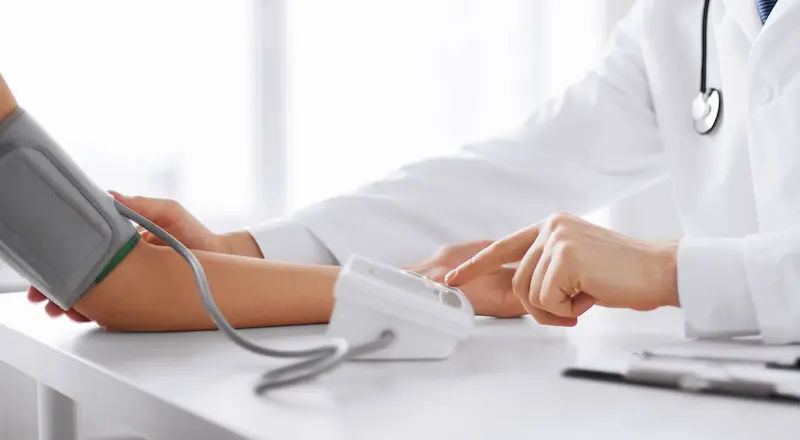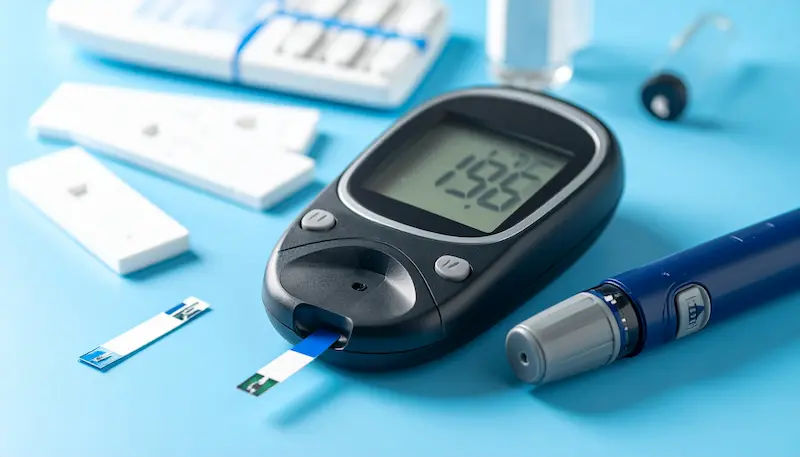Guide to How Stress Leads To Hypertaension
Discover how stress contributes to hypertension (high blood pressure). Learn about the biological link, risk factors, symptoms, and effective strategies to manage stress and protect your heart health.

Written by Dr. Rohinipriyanka Pondugula
Reviewed by Dr. Siri Nallapu MBBS
Last updated on 13th Jan, 2026

Introduction
Feeling your heart pound during a stressful work deadline or a difficult conversation is a universal experience. But what happens when that temporary spike in pressure becomes a constant, silent companion? The link between chronic stress and hypertension (high blood pressure) is more than just a feeling; it's a complex biological process with serious implications for your long-term health. This isn't just about occasional worry—it's about how sustained pressure, both mental and physical, can rewire your body's systems. Understanding this connection is the first step toward taking back control. This guide will demystify the science behind how stress leads to hypertension, identify the risk factors, and provide you with practical, evidence-based strategies to manage both your stress and your blood pressure for a healthier heart and a calmer mind.
Understanding the Basics: Stress and Blood Pressure
To understand the connection, we must first define the two key players.
What is Stress? Acute vs. Chronic
Stress is your body's natural reaction to any demand or challenge. In short bursts, it's beneficial—helping you avoid danger or meet a deadline. This is acute stress. However, when challenges pile up without relief, it becomes chronic stress. This long-term, grinding stress keeps your body in a constant state of high alert, which is where the damage begins.
What is Hypertension (High Blood Pressure)?
Hypertension is a condition where the force of your blood pushing against the walls of your arteries is consistently too high. Often called the "silent killer," it typically has no symptoms but silently damages blood vessels, increasing the risk of heart attack, stroke, and kidney disease. A normal reading is below 120/80 mmHg. Consistent readings of 130/80 mmHg or higher are classified as hypertension.
The Biological Link: How Stress Triggers Hypertension
The pathway from a stressful thought to hardened arteries is a fascinating and well-researched chain of events.
The Fight-or-Flight Response Explained
When you perceive a threat, your brain activates the sympathetic nervous system, triggering the "fight-or-flight" response. This is an ancient survival mechanism designed to prepare your body for immediate action.
The Role of Hormones: Cortisol and Adrenaline
This response floods your system with stress hormones, primarily adrenaline and cortisol. Adrenaline causes your heart to beat faster and your blood vessels to narrow, providing a temporary boost in energy and blood pressure to your muscles. Cortisol, the primary stress hormone, increases sugars (glucose) in the bloodstream and enhances your brain's use of glucose.
Consult a General Practitioner for the best advice
Cortisol's Long-Term Damage to Blood Vessels
While useful briefly, chronically elevated cortisol levels are problematic. Over time, cortisol can impair the lining of your blood vessels, making them less flexible and more prone to plaque buildup (atherosclerosis). It also encourages your kidneys to retain sodium and water, further increasing blood volume and pressure. This is a key mechanism in how sustained stress causes high blood pressure.
Inflammation: The Silent Consequence of Chronic Stress
Modern research highlights that chronic stress leads to systemic inflammation. This inflammation damages arterial walls, promoting the accumulation of plaque. This narrows the arteries, forcing your heart to work harder to pump blood, which directly elevates your blood pressure and increases your heart disease risk.
Beyond Biology: Behavioral Factors
Biology doesn't tell the whole story. Stress often leads to behaviors that are independent risk factors for hypertension.
- Stress-Induced Habits That Raise Blood Pressure
- When people feel overwhelmed, they often seek comfort in unhealthy coping mechanisms.
Poor Dietary Choices and Overeating
Stress drives many towards "comfort foods" that are typically high in salt, sugar, and unhealthy fats. High sodium intake is a direct cause of increased blood pressure, as it disrupts the body's fluid balance.
Increased Alcohol and Tobacco Use
Some may drink alcohol or smoke to calm their nerves. However, alcohol raises blood pressure and tobacco chemicals damage artery linings and cause immediate, temporary spikes in BP. This creates a vicious cycle where the coping mechanism worsens the problem.
Physical Inactivity and Disrupted Sleep
Feeling stressed can zap your energy and motivation to exercise. Furthermore, stress is a major contributor to poor sleep quality. Both physical inactivity and lack of sleep are well-established contributors to hypertension.
- Are You at Risk? Identifying Stress-Related Hypertension
- Recognising the signs is crucial for early intervention.
- Symptoms of Chronic Stress
- Emotional: Anxiety, irritability, depression, feeling overwhelmed.
- Physical: Headaches, muscle tension, fatigue, sleep problems, stomach issues.
- Behavioral: Social withdrawal, changes in appetite, procrastination.
Signs and Symptoms of Hypertension
Hypertension itself is often asymptomatic. However, severely high blood pressure might cause:
- Headaches
- Shortness of breath
- Nosebleeds
- Flushing
- Dizziness
- Chest pain (This is a medical emergency—seek immediate help)
The only way to know for sure is to get your blood pressure checked regularly. If you're experiencing chronic stress and haven't had a check-up recently, it's a good idea to monitor your numbers. Apollo24|7 offers a convenient home collection for tests like lipid profiles and HbA1c, which are part of a complete cardiac health picture.
Breaking the Cycle: Managing Stress to Control Blood Pressure
The good news is that this cycle can be broken. Managing one effectively helps manage the other.
Immediate Stress-Relief Techniques
- Deep Breathing: Activates the parasympathetic nervous system (the "rest-and-digest" response), slowing your heart rate and lowering BP.
- Short Breaks: A 5-minute walk away from a stressful situation can reset your hormonal response.
Long-Term Lifestyle Modifications
The Power of Regular Exercise
Physical activity is a powerhouse. It helps lower cortisol levels, improves vascular health, helps with weight management, and is a proven method for how to lower blood pressure from stress. Aim for 150 minutes of moderate exercise per week.
Mindfulness and Meditation Practices
Studies show that mindfulness meditation can significantly reduce stress and mildly lower blood pressure. It trains your brain to manage reactions to stressors more effectively.
Building a Strong Social Support Network
Connecting with friends, family, or support groups provides an outlet for your worries and can diminish the perceived intensity of stressors.
When to Seek Professional Help
While lifestyle changes are powerful, they are not always enough. If your stress feels unmanageable, you're experiencing symptoms of anxiety or depression, or your blood pressure remains high despite your efforts, consult a doctor online with Apollo24|7 for further evaluation. They can provide therapy referrals, counseling, or, if necessary, prescribe medication to help manage both stress and hypertension. Never stop or start blood pressure medication without consulting a doctor.
Conclusion
The journey from a stressful day to a hypertension diagnosis is not inevitable, but it is a well-paved path if left unchecked. The connection between stress and high blood pressure is a powerful reminder that our mental and physical health are inextricably linked. By understanding the biological and behavioral mechanisms at play—from hormonal floods to comfort-food cravings—you empower yourself to make different choices. Prioritising stress management isn't just about feeling calmer; it's a critical cardiovascular health strategy. Start small: take a deep breath, go for a walk, or reach out to a friend. Your heart, and your peace of mind, will thank you for years to come. Take the first step today by assessing your stress levels and considering a blood pressure check to know where you stand.
Consult a General Practitioner for the best advice
Consult a General Practitioner for the best advice

Dr Suseela
General Physician
5 Years • MBBS
Bengaluru
Apollo Medical Center, Marathahalli, Bengaluru

Dr. Mainak Baksi
General Practitioner
13 Years • MBBS , MD (MPH)
Howrah
Mainak Baksi Clinic, Howrah
(50+ Patients)

Dr. Rajib Ghose
General Physician/ Internal Medicine Specialist
25 Years • MBBS
East Midnapore
VIVEKANANDA SEBA SADAN, East Midnapore

Dr. Ashita Kuruvilla
General Practitioner
7 Years • MBBS
Kolkata
KVC CLINIC, Kolkata

Dr Aswathy D C
General Practitioner
6 Years • MBBS
Bangalore
Apollo Clinic Bellandur, Bangalore
Consult a General Practitioner for the best advice

Dr Suseela
General Physician
5 Years • MBBS
Bengaluru
Apollo Medical Center, Marathahalli, Bengaluru

Dr. Mainak Baksi
General Practitioner
13 Years • MBBS , MD (MPH)
Howrah
Mainak Baksi Clinic, Howrah
(50+ Patients)

Dr. Rajib Ghose
General Physician/ Internal Medicine Specialist
25 Years • MBBS
East Midnapore
VIVEKANANDA SEBA SADAN, East Midnapore

Dr. Ashita Kuruvilla
General Practitioner
7 Years • MBBS
Kolkata
KVC CLINIC, Kolkata

Dr Aswathy D C
General Practitioner
6 Years • MBBS
Bangalore
Apollo Clinic Bellandur, Bangalore
More articles from High Blood Pressure
Frequently Asked Questions
Can anxiety cause high BP readings at the doctor's office?
Yes, this is known as 'white coat hypertension.' The anxiety of being in a clinical setting can cause a temporary spike in blood pressure. For an accurate picture, monitoring your blood pressure at home or through a 24-hour ambulatory monitor may be recommended.
What are the best natural ways to reduce stress and BP together?
The most effective natural methods include regular aerobic exercise (like brisk walking or swimming), adopting mindfulness or meditation practices, reducing sodium intake, eating a heart-healthy diet (like the DASH diet), ensuring 7-9 hours of quality sleep, and maintaining strong social connections.
If I lower my stress, will my blood pressure go back to normal?
For many people with stress-induced hypertension, effectively managing chronic stress can lead to a significant reduction in blood pressure. However, if hypertension has been present for a long time, it may have caused permanent changes. Stress management should be part of a comprehensive plan, which may still include lifestyle changes and medication as advised by a doctor.
How quickly can stress raise blood pressure?
An acute stressor can cause your blood pressure to spike within seconds or minutes. The effects of chronic stress on developing sustained hypertension build up over weeks, months, and years of repeated activation of the stress response system.
What is the difference between stress and anxiety when it comes to blood pressure?
Stress is typically a response to an external trigger (a work deadline, an argument) and usually subsides once the situation is resolved. Anxiety is a persistent feeling of apprehension



.webp)
